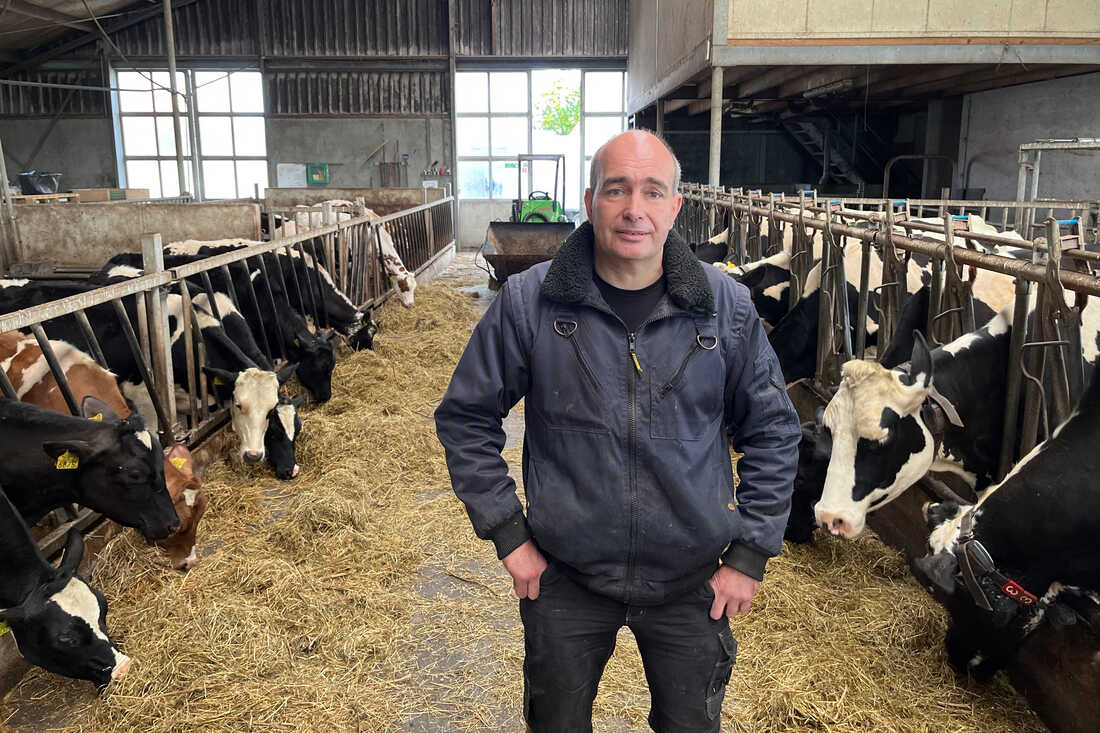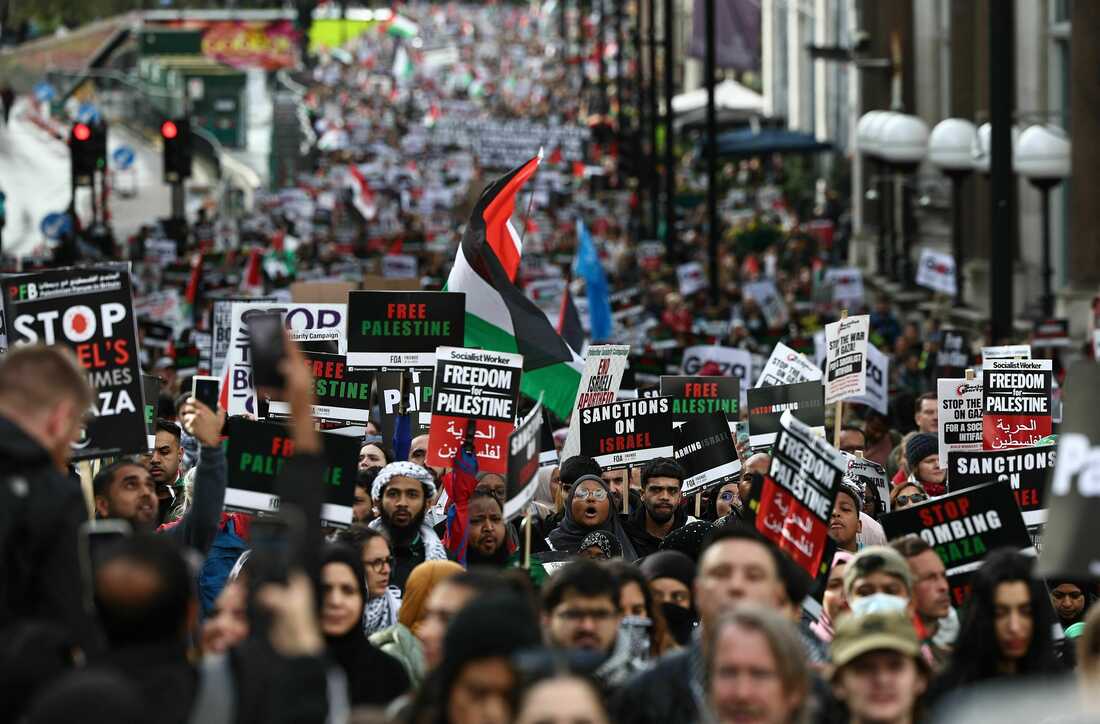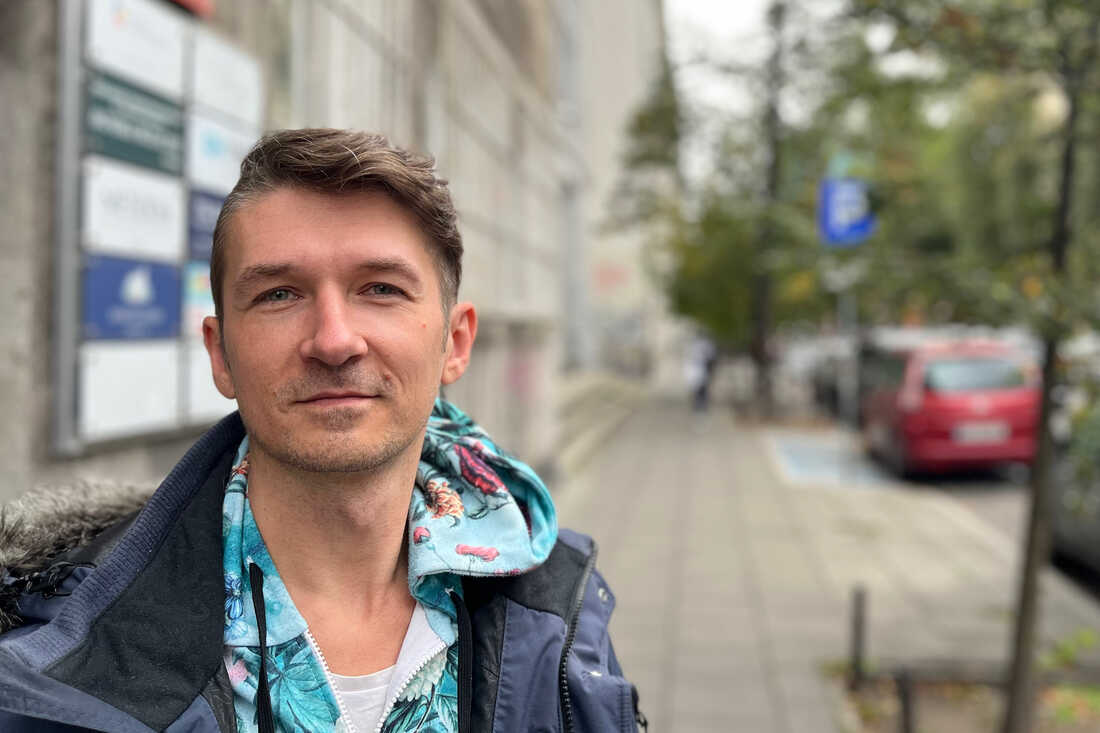In the Netherlands, a farmers party taps into widespread discontent with government
By Rob Schmitz
Farmer Wilbert van der Post is worried that the Dutch government's new nitrogen reduction rules will force him, a fourth-generation farmer, out of business. He plans to vote for the Farmer-Citizens Movement, known in the Netherlands by its acronym, BBB, on election day in November. Rob Schmitz/NPR hide caption
toggle caption Rob Schmitz/NPRFarmer Wilbert van der Post is worried that the Dutch government's new nitrogen reduction rules will force him, a fourth-generation farmer, out of business. He plans to vote for the Farmer-Citizens Movement, known in the Netherlands by its acronym, BBB, on election day in November.
Rob Schmitz/NPRLEIDEN, The Netherlands — On a strip of land amongst the canals that crisscross the flat Dutch countryside stand 50 black-and-white Holstein cows, heads down, chewing on a lunch of hay served to them by their owner, farmer Wilbert van der Post.
"I'm the fourth generation on this farm," says van der Post as he spreads the hay along the floor of the barn. "My great-grandfather came here around 1900."
Van der Post now fears he might be his family's last generation of farmers. The manure and urine his cows produce is rich in nitrogen compounds that contribute to smog, harming the lungs of his country's 17.5 million residents. Van der Post's cows are among tens of millions of animals nationwide that are contributing to what environmentalists call a nitrogen crisis.
Natasja Oerlemans, head of food and agriculture at the World Wildlife Fund of the Netherlands, says the country has the highest level of nitrogen compound emissions in Europe. Rob Schmitz/NPR hide caption
toggle caption Rob Schmitz/NPRNatasja Oerlemans, head of food and agriculture at the World Wildlife Fund of the Netherlands, says the country has the highest level of nitrogen compound emissions in Europe.
Rob Schmitz/NPROerlemans says Dutch farmers import most of their animals and nitrogen-rich feed. The small nation produces meat, dairy and eggs from 4 million cows, 13 million pigs and 104 million chickens each year. She says the urine and manure these animals produce emit high levels of nitrogen compounds.
"If you look at the European nitrogen emission maps in the Netherlands, it's not even dark red, it's not even purple, but it's black," says Oerlemans. "It's the highest value in Europe as far as it goes for nitrogen emissions."
Oerlemans supports the 2019 Dutch court decision directing the government to do something to drastically cut these emissions, but she also thinks farmers should receive government subsidies while they cull their herds and transition to less intensive farming.
Dutch farmers, though, would prefer to maintain the status quo. They've shut down the nation's highways with their tractors to protest the proposed nitrogen rules.
In the past four years, these rallies have evolved into what's called the Farmer-Citizen Movement, a political party that shocked many earlier this year when it won 16 of the 75 seats in the Dutch Senate, more than any other party.
The party has garnered support well beyond the country's 50,000 farmers and is now polling in third place as the country gears up for a national election in late November.
Farmers' protests have resonated beyond the fields
"People in Holland have the feeling that the government's needs are more important than the needs of the citizens," says Caroline van der Plas, founder of the Farmer-Citizen Movement party, known in Dutch as the BoerBurgerBeweging, or by its acronym, the BBB.
Political analysts and the Dutch media have labeled the BBB a protest movement and a single-issue party, but van der Plas, who spent much of her career as a journalist and is now a member of parliament — and has never worked as a farmer — is quick to differ.
Holstein cows at the farm of Wilbert van der Post eat hay and feed. A series of court rulings has forced the Dutch government to come up with ways to reduce nitrogen pollution, among them cutting animal herds by half by the end of this decade. Rob Schmitz/NPR hide caption
toggle caption Rob Schmitz/NPRHolstein cows at the farm of Wilbert van der Post eat hay and feed. A series of court rulings has forced the Dutch government to come up with ways to reduce nitrogen pollution, among them cutting animal herds by half by the end of this decade.
Rob Schmitz/NPRFarmer Wilbur van der Post, inside his barn with his cows, agrees. He says the proposed nitrogen ban would reduce emissions in the Netherlands, but it wouldn't reduce global nitrogen emissions.
"We produce more per hectare than other countries with the same amount of manure," he says. "The footprint is one of the lowest in the world. If we reduce the agriculture sector here in the Netherlands, other countries will have to produce more. But there, the footprint is higher."
And that's why, he says, he'll be voting for the Farmer-Citizens Movement on election day, Nov. 22. Unless his party ends up in government, he says, no amount of cow-cuddling will be able to soothe his anger at those in positions of power.



